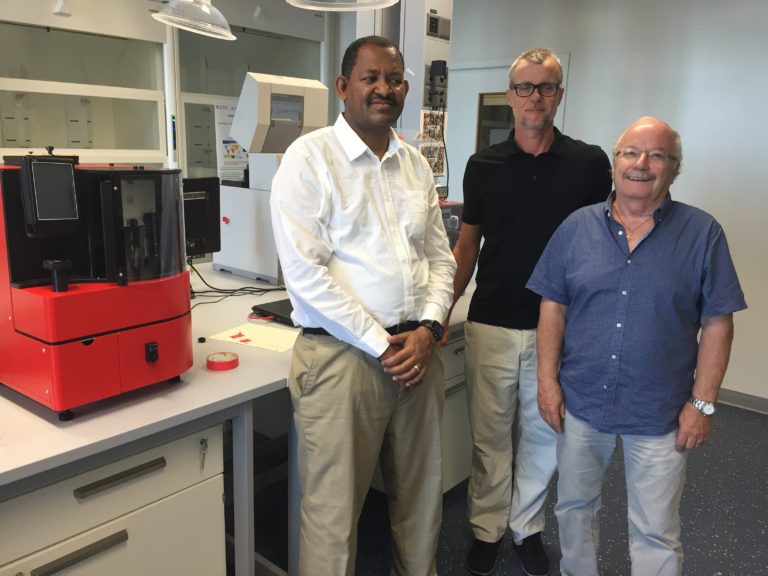Sudan, 2017
According to the agreement between Pharmelp and the University of Khartoum (Sudan), a CE (Capillary Electrophoresis) device from WynSep has been installed at the University of Khartoum end of 2017.

Start of the project in Khartoum, Prof. Elbashir
In a nutshell
True to its mission Pharmelp agreed with the request of Prof. A. Elbashir from the University of Khartoum who asked for the implementation of a capillary electrophoresis (CE) instrument. The main objectives are the training of the students and the quality control of the drug products in Sudan.
This project has been conducted in collaboration with the University and with the Federal Ministry of Health, National Medicines and Poisons Board of Sudan.
This project has been carried out thanks to: the financial support of the Swiss Ambassy in Khartoum, Ambassador Martin Strub; the collaboration with the Geneva-Lausanne School of Pharmaceutical Sciences (Prof. Serge Rudaz); the collaboration with the School of Engineering and Architecture of Fribourg (Samuel Roth, engineer HES, in charge of the analytical chemistry laboratory).
Participants
Correspondents
Prof Abdalla A. Elbashir, professor of Analytical Chemistry , University of Khartoum
Dr Mohamed Elbassen Mohamed Imam, Secretary-General, Ministry of Health
Dr Noon Garelbani, NDQCL manager
People in charge
Prof Abdalla A. Elbashir, professor of Analytical Chemistry , University of Khartou
in collaboration with Dr Shaza W. Shantier, Faculty of Pharmacy, University of Khartoum
The main goals of this project are:
-
To train the pharmacy students of the university.
-
To provide university students with opportunities for theses focused on the evaluation of the local drug products.
-
To allow the performance of the quality control of key drug products according to the WHO in collaboration with the National Control Laboratory of the Health Ministry.
At first Prof. Elbashir (Project Leader at the University of Khartoum, Sudan) has attended a four days training on this equipment in the analytical chemistry laboratory at the College of
Engineering and Architecture of Fribourg. This training has been given by S. Roth, capillary electrophoresis specialist and supervised by Prof. S. Rudaz and Prof. C. Rohrbasser.Prof. Elbashir is now able to perform the analyses of the drug products according to the methods which have been provided. He is able to discriminate between a drug product containing the correct active ingredient quantity and a drug product containing a wrong active ingredient or a drug product without the active ingredient. He is also able to train his colleagues in his laboratory in Sudan to use and maintain this instrument.
A support via internet, e-mail or phone is provided by the different partners so that this project remains viable and successful.
In conclusion, it is important to notice that this project has got a financial and logistical support from the Federal Department of Foreign Affairs (FDFA).



